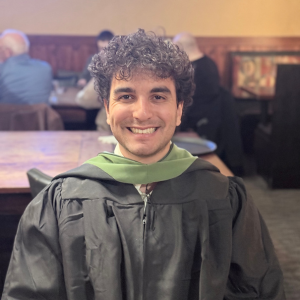Master of Science Degree
The Master of Science in Global Health is a 100% online program designed to empower graduates with the tools and skills needed to address global health challenges. Students complete 30 credits, which can be completed in one year, including nine core courses (27 credits) focusing on core competencies in management, ethics, evidence-based practice, globalization of health and healthcare, strategic analysis, capacity strengthening, collaboration and communication.
Students complete 3 elective credits by either completing an additional online course, participating in an existing study abroad course, an approved independent study abroad location of their choice, or an independent study project established mutually between the student and program director.
Students will have unique opportunities to learn from experienced global health practitioners and researchers in many countries around the world.

Become a Leader in Global Health
Students in the Master of Science in Global Health Program will benefit from a unique approach and acquire the necessary toolset to work collaboratively across cultures and disciplines. A key feature of the program is the multi-disciplinary faculty and student body that focuses on the interrelatedness and importance of human, animal and environmental health, summarized in the concept of One Health.
The MS program introduces you to concepts of Global Health Practice, Transdisciplinary Collaborations in Global Health, Global Burden of Disease, and Evidence-based Practice. You’ll become empowered through focus on core competencies in management, ethics, evidence-based practice, globalization of health and healthcare, strategic analysis, capacity strengthening, collaboration and communication. Students are invited to participate in an existing global course in one of nine countries, an approved independent elective at a location of their choice, or they may complete an additional online 3-credit course to meet the program elective requirement.
Before completing the degree, students will develop a capstone project as a synthesis and application of the knowledge, tools, and skills acquired throughout the program.
|
100% Online Complete your graduate degree in Global Health 100% Online. |
|
|
30 Credits Can be completed in as little as one year. |
|
|
Experienced Faculty Learn from global health practitioners and researchers. |
|
|
Stackable Credentials Opportunity to apply to receive the Global Health Graduate Certificate after completion of 3 courses. |
Hear from Program Graduates

"If you plan to work in not just health care, but any service field, I think this program is a great way to open your horizons and learn about different cultures. That way, if you work with people from different cultures and backgrounds, you're equipped to understand and care for them."
- Saeed Salah, MS in Global Health Class of 2025
Create a career in Global Health
Global health professionals can fulfill their career goals working inside the U.S. or internationally. Graduates pursue global health career opportunities in multi-national organizations, academia and research institutes, non-governmental organizations, non-profit organizations, global consulting companies, health organizations, government at the city, state and federal levels, and more.
Our Alumni at Work
MS in Global Health graduates aren't just working in the healthcare sector. The multi-disciplinary approach led by expert faculty creates pathways for alumni to excel across all areas of the workforce. Below are just some of the fields MS program alumni are actively working in:
- Artificial Intelligence Training
- Environmental Health
- Global Health
- Higher Education
- Human Resources
- Marketing
- Nutrition
- Nursing
- Orthopedic Technology
- Orthopedic Surgery
- Public Health
- Water Treatment
Master’s in Global Health Curriculum
The program equips graduates with critical conceptual and practice skills through rigorous coursework offered from a multidisciplinary faculty. Courses include:
-
OST 821 One Health – Transdisciplinary Collaborations in Global Health
This course focuses on transdisciplinary collaboration amongst different animal health, human health and non-health specialists to solve problems at the interface of people, animals and their environment. Students will learn about the One Health framework approach including its history, theoretical issues, added value and application to global health, and the relationship between access to quality and security of water, sanitation, food and air on animal and human health. The One Health approach will be used to assess and analyze various human, animal and environmental global health and well-being issues. Students will also learn to recognize contributions and added value of transdisciplinary teams in solving One Health issues; the role and added value of social sciences, economics and communications in One Health and how the approach can aid in translating science into policy.
-
OST 822 Introduction to Global Health Practice
This course focuses on differences in national models of healthcare delivery, issues of social justice and human rights principles, and strategies to engage marginalized and vulnerable populations. Students will learn about important milestones in the history of global health; roles and relationships of major entities influencing global health and development; different national models of health systems for provision of healthcare and their respective effects on health and healthcare expenditures; how global trends in healthcare practice, commerce and culture, multinational agreements and multinational organizations contribute to the quality and availability of health and healthcare locally and internationally; general trends and influences in the global availability and movement of healthcare workers; the healthcare workforce crisis in the developing world, contributing factors and strategies to address this problem; social justice and human rights principles in addressing global problem problems; how cultural context influences perceptions of health and disease; and personal motivations and roles in global health practice.
-
OST 823 Global Burden of Disease
This course focuses on major causes of, types of, and efforts to reduce morbidity and mortality around the world. Techniques for monitoring and validating the health status of populations. Students will learn about major causes of morbidity and mortality around the world and how the risk for disease varies with regions; major public health efforts to reduce disparities in global health; how to validate the health status of populations using available data; major social and economic determinants of health and their effects on the access to, and quality of, health services and on differences in morbidity and mortality between and within countries; contribution of animal health and disease to the global burden of human disease and the impact of environmental degradation on the global burden of human and animal disease.
-
OST 824 Emerging Topics in Global Health
This course focuses on emerging topics in global health and connections to current issues. Students will learn about key ideas in the design of health communication interventions for diverse populations based on existing communication science, and elements of health communication interventions targeting specific cultural groups.
-
OST 825 Ethical Issues in Global Health
This course focuses on international standards for protection of human subjects. Social justice and human rights principles within the global context. Students will learn basic concepts underlying global health and attendant of ethical issues; ethical concepts and theories; ethical issues in the context of various global health contexts; relationship between health, human rights and global inequities; process of learning to be a professional in global health and global health ethics; local and national codes of ethics relevant to one’s working environment; fundamental principles of international standards for the protection of human subjects in diverse cultural settings; and the role of WHO in linking health and human rights, Universal Declaration of Human Rights, International Ethical Guidelines for Biomedical Research Involving Human Subjects.
-
OST 827 Global Health Management
This course focuses on leadership and management within the context of global healthcare, including interprofessional and intercultural values and communication. Students will learn about functions, skills and competencies for management and leadership in global health settings using project management tools and techniques for program planning, implementation and evaluation. Students will learn about inter-professional values and communication skills that demonstrate respect for, and awareness of, unique cultures, values, roles/responsibilities and the expertise of colleagues and stakeholders. In understanding these skills students will reflect on and evaluate their own limits in skills, knowledge and abilities. Leadership practices supporting collaborative practice and team effectiveness will be explored in the context of strengthening health systems. The inclusion of diverse constituencies in partnerships and fostering interactive learning with these partners will lead to the development of lessons with community partners to reduce barriers to healthcare in low-resource settings. Students will adapt discipline-specific skills and practice in a resource-constrained setting.
-
OST 828 Global Health Capstone
This course focuses on the integration of knowledge, skills and competencies acquired in global health. The capstone course is the opportunity for students to synthesize their learning from the program and to present this through the development of three elements. Students will spend this course working on the development of an ePortfolio where they will highlight their work and experiences from this program. Students will also produce a paper and oral presentation on a topical area of interest related to a global health issue.
-
OST 829 Global Health Community Assessment
This course focuses on the assessment of community health scenarios. Techniques for collaboration and co-creation with community partners. Students will learn about the field of community-engaged global health, methods and theories to current global health practice debates; collaborating with a host or partner organization to assess the organization’s operational capacity; co-creation strategies with communities to strengthen community capabilities and contribute to health disparity reduction and improvement of community health; integration of community assets and resources to improve health of individuals and populations; and how health, illness and medicine shape our lived experiences.
-
OST 831 Evidence-Based Practice in Global Health
This course focuses on critical appraisal of scientific studies of global health interventions. Students will learn about evidence-based program planning and evaluation, including evidence-based decision making, composing a valid research statement, collecting and evaluating data and evidence to answer research questions, critiquing evidence for importance and validity in a global health context, and interpreting and evaluating evidence presented within scientific literature.

